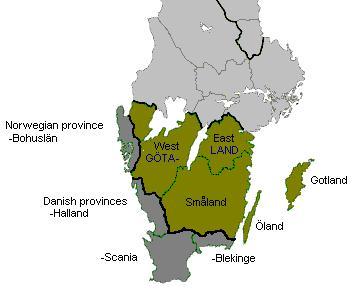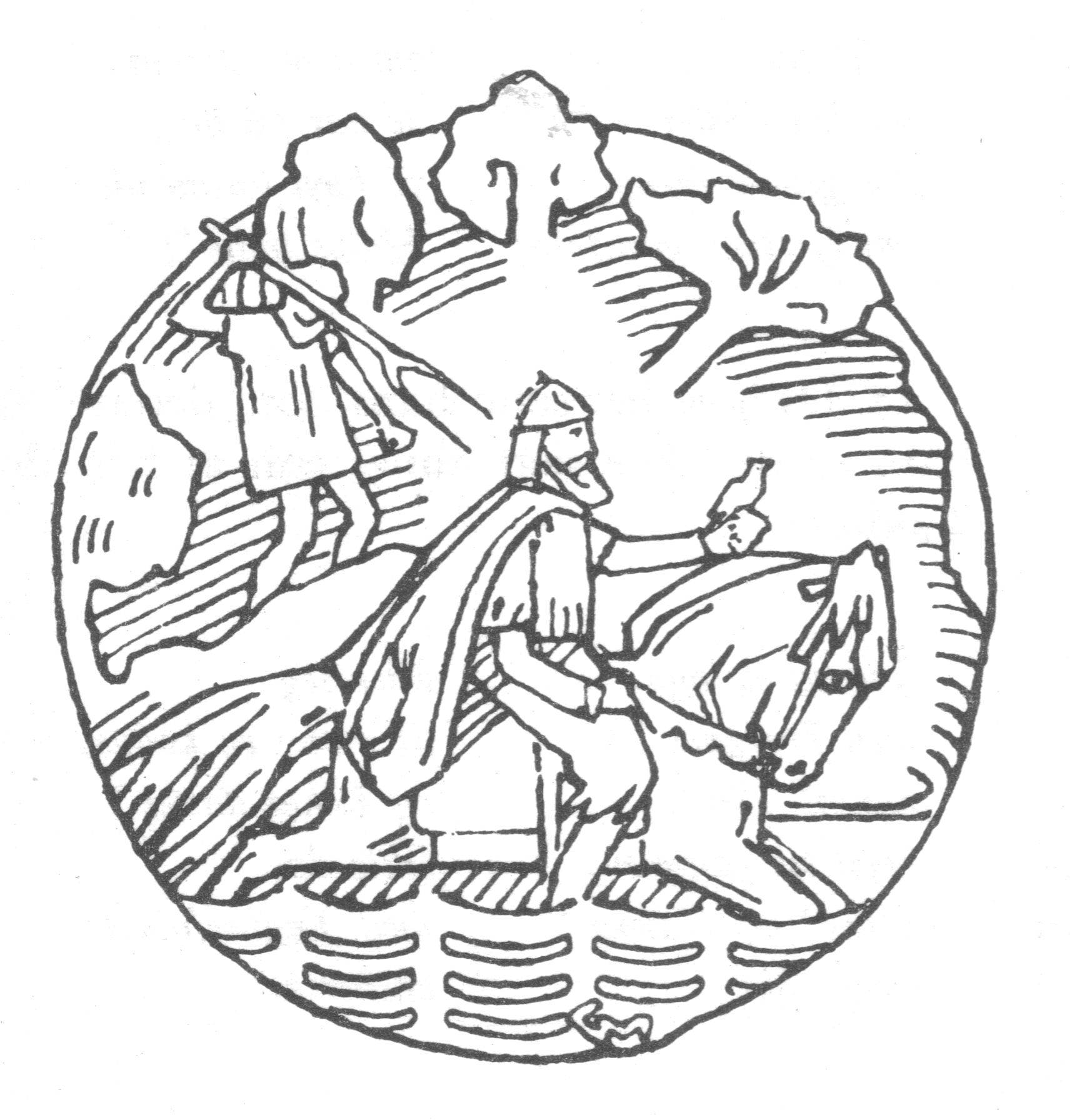|
Björn Eriksson
Björn (traditionally ruled 882–932) according to the '' Hervarar saga'' and ''Harald Fairhair's saga'' was the father of Olof (II) Björnsson and Eric the Victorious, also a grandfather of Styrbjörn the Strong. According to the two sagas, he was the son of an Erik who fought Harald Fairhair and who succeeded the brothers Björn at Hauge and Anund Uppsale: :King Önund had a son called Eric, and he succeeded to the throne at Upsala after his father. He was a rich King. In his days Harold the Fair-haired made himself King of Norway. He was the first to unite the whole of that country under his sway. Eric at Upsala had a son called Björn, who came to the throne after his father and ruled for a long time. The sons of Björn, Eric the Victorious, and Olaf succeeded to the kingdom after their father. Olaf was the father of Styrbjörn the Strong.(''Hervarar saga'') The latter saga relates that he ruled for 50 years: :There were disturbances also up in Gautland as long as King Eir ... [...More Info...] [...Related Items...] OR: [Wikipedia] [Google] [Baidu] |
Legendary King Of Sweden
The legendary kings of Sweden () according to legends were rulers of Sweden and the Swedes who preceded Eric the Victorious and Olof Skötkonung, the earliest reliably attested Swedish kings. Though the stories of some of the kings may be embellished tales of local rulers or chiefs that actually existed. For example, Hygelac (500 A.D.) is believed to have historical basis due to his name being attested in Frankish, English, Danish and Icelandic sources. But the historicity of most legendary kings remains impossible to verify due to a lack of sources.Dick, Harrison 2011 http://blog.svd.se/historia/2011/10/13/varfor-jag-inte-tror-pa-sagokungar/ The modern Swedish monarchy considers Eric the Victorious to have been the first King of Sweden. In medieval Swedish lists of kings, the figure generally represented as the first king of Sweden is Olof Skötkonung, the first Christian king of Sweden and the first Swedish king to mint coins. The earlier kings are for the most part only attes ... [...More Info...] [...Related Items...] OR: [Wikipedia] [Google] [Baidu] |
Götaland
Götaland (; also '' Geatland'', '' Gothia'', ''Gothland'', ''Gothenland'' or ''Gautland'') is one of three lands of Sweden and comprises ten provinces. Geographically it is located in the south of Sweden, bounded to the north by Svealand, with the deep woods of Tiveden, Tylöskog and Kolmården marking the border. Götaland once consisted of petty kingdoms, and their inhabitants were called ''Gautar'' in Old Norse. However, the term mainly referred to the population of modern Västergötland. It is agreed that these were the same as the ''Geats'', the people of the hero Beowulf in England's national epic, ''Beowulf''. The modern state of Sweden started forming when some provinces of Götaland gradually became more and more politically intertwined with those of Svealand. This process can be traced back to at least the 11th century, and would continue for several hundred years. Other parts of modern Götaland were at that time either Danish or Norwegian. The province of Smålan ... [...More Info...] [...Related Items...] OR: [Wikipedia] [Google] [Baidu] |
Erik Anundsson
Eric Anundsson or Eymundsson was a semi-legendary Swedish king who supposedly ruled during the 9th century. The Norse sagas describe him as successful in extending his realm over the Baltic Sea, but unsuccessful in his attempts of westward expansion. There is no near-contemporary evidence for his existence, the sources for his reign dating from the 13th and 14th centuries. These sources, Icelandic sagas, are generally not considered reliable sources for the periods and events they describe. Controversially, older Swedish historians have identified Eric with another legendary Swedish king, '' Erik Weatherhat'', who is mentioned in some medieval king-lists as the predecessor of Eric the Victorious. However, Saxo Grammaticus identifies Erik Weatherhat with another figure, a son of the legendary Viking Ragnar Lodbrok. Eric's reign He is given as the son of Anund Uppsale in the '' Hervarar saga'' (13th century): :''Eiríkr hét sonr Önundar konungs, er ríki tók eptir föður sinn ... [...More Info...] [...Related Items...] OR: [Wikipedia] [Google] [Baidu] |
List Of Legendary Kings Of Sweden
The legendary kings of Sweden () according to legends were rulers of Sweden and the Swedes who preceded Eric the Victorious and Olof Skötkonung, the earliest reliably attested Swedish kings. Though the stories of some of the kings may be embellished tales of local rulers or chiefs that actually existed. For example, Hygelac (500 A.D.) is believed to have historical basis due to his name being attested in Frankish, English, Danish and Icelandic sources. But the historicity of most legendary kings remains impossible to verify due to a lack of sources.Dick, Harrison 2011 http://blog.svd.se/historia/2011/10/13/varfor-jag-inte-tror-pa-sagokungar/ The modern Swedish monarchy considers Eric the Victorious to have been the first King of Sweden. In medieval Swedish lists of kings, the figure generally represented as the first king of Sweden is Olof Skötkonung, the first Christian king of Sweden and the first Swedish king to mint coins. The earlier kings are for the most part only attes ... [...More Info...] [...Related Items...] OR: [Wikipedia] [Google] [Baidu] |
Early Swedish History
{{disambiguation, geo ...
Early may refer to: History * The beginning or oldest part of a defined historical period, as opposed to middle or late periods, e.g.: ** Early Christianity ** Early modern Europe Places in the United States * Early, Iowa * Early, Texas * Early Branch, a stream in Missouri * Early County, Georgia Other uses * ''Early'' (Scritti Politti album), 2005 * ''Early'' (A Certain Ratio album), 2002 * Early (name) * Early effect, an effect in transistor physics * Early Records, a record label * the early part of the morning See also * Earley (other) Earley is a town in England. Earley may also refer to: * Earley (surname), a list of people with the surname Earley * Earley (given name), a variant of the given name Earlene * Earley Lake, a lake in Minnesota *Earley parser, an algorithm *Earley ... [...More Info...] [...Related Items...] OR: [Wikipedia] [Google] [Baidu] |
Emund Eriksson
Emund Eriksson (?-c. 970), (English: Edmund), was a Swedish king whose historicity is only known from a single source, the Gesta Hammaburgensis ecclesiae pontificum which was written by Adam of Bremen in c. 1075. Reign According to Adam of Bremen, a certain King Ring ruled the Swedes together with his sons Erik and Emund in about 936. In a later chapter, Adam mentions Emund Eriksson as ruling Sweden some time in the second half of the 10th century. He was presumably the son of Erik Ringsson. Adam relates that Emund was king at the same time as King Harald Bluetooth of Denmark (c. 958/64-985) expanded his power overseas and subdued Norway (in about 970). Emund was an ally of Harald, and showed a friendly attitude to Christian people who came to him. That German missionary efforts were renewed about this time is related by Adam in the following chapter. The Archbishop of Hamburg-Bremen, Adaldag (937-988), appointed a Dane called Odinkar the Elder for the Swedish lands. Being a pious ... [...More Info...] [...Related Items...] OR: [Wikipedia] [Google] [Baidu] |
Adam Of Bremen
Adam of Bremen ( la, Adamus Bremensis; german: Adam von Bremen) (before 1050 – 12 October 1081/1085) was a German medieval chronicler. He lived and worked in the second half of the eleventh century. Adam is most famous for his chronicle ''Gesta Hammaburgensis ecclesiae pontificum'' (''Deeds of Bishops of the Hamburg Church''). He was "one of the foremost historians and early ethnographers of the medieval period". In his chronicle, he included a chapter mentioning the Norse outpost of Vinland, and was thus the first European to write about the New World. Life Little is known of his life other than hints from his own chronicles. He is believed to have come from Meissen, then its own margravate. The dates of his birth and death are uncertain, but he was probably born before 1050 and died on 12 October of an unknown year (possibly 1081, at the latest 1085). From his chronicles, it is apparent that he was familiar with a number of authors. The honorary name of ''Magister Adam'' sho ... [...More Info...] [...Related Items...] OR: [Wikipedia] [Google] [Baidu] |
Thorgny Lawspeaker
Torgny the Lawspeaker (Old Icelandic: ''Þorgnýr lögmaðr'' , Swedish: ''Torgny Lagman'') is the name of one of at least three generations of lawspeakers by the name ''Þorgnýr'', who appear in the ''Heimskringla'' by the Icelandic scholar and chieftain Snorri Sturluson, and in the less known ''Styrbjarnar þáttr Svíakappa'' and ''Hróa þáttr heimska''. They were the lawspeakers of Tiundaland, and all lawspeakers in the Swedish kingdom were their subordinates. The one who is the most famous is reported by the ''Heimskringla'' to have lived in the time of Olof Skötkonung and Olav the Holy, and there is an extensive account on him in this source. This Þorgnýr is held to have historic basis, but Snorri's account is doubted by modern Swedish historians,Lagerquist 1997:36 who lack native Swedish documentation on the Tiundaland lawspeakers of this time. Snorri relates: : ''In Tiundaland there was a lagman'' lawspeaker.html" ;"title="/nowiki>lawspeaker">/nowiki>lawspeaker''who ... [...More Info...] [...Related Items...] OR: [Wikipedia] [Google] [Baidu] |
Snorri Sturluson
Snorri Sturluson ( ; ; 1179 – 22 September 1241) was an Icelandic historian, poet, and politician. He was elected twice as lawspeaker of the Icelandic parliament, the Althing. He is commonly thought to have authored or compiled portions of the ''Prose Edda'', which is a major source for what is today known as Norse mythology, and ''Heimskringla'', a history of the Norwegian kings that begins with legendary material in ''Ynglinga saga'' and moves through to early medieval Scandinavian history. For stylistic and methodological reasons, Snorri is often taken to be the author of ''Egil's saga''. He was assassinated in 1241 by men claiming to be agents of the King of Norway. Biography Early life Snorri Sturluson was born in (commonly transliterated as Hvamm or Hvammr) as a member of the wealthy and powerful Sturlungar clan of the Icelandic Commonwealth, in AD 1179. His parents were ''Sturla Þórðarson the Elder'' of ''Hvammur'' and his second wife, ''Guðný Böðvarsdóttir''. ... [...More Info...] [...Related Items...] OR: [Wikipedia] [Google] [Baidu] |
Olaf The Holy
Olaf II Haraldsson ( – 29 July 1030), later known as Saint Olaf (and traditionally as St. Olave), was King of Norway from 1015 to 1028. Son of Harald Grenske, a petty king in Vestfold, Norway, he was posthumously given the title ''Rex Perpetuus Norvegiae'' ( en, Eternal/Perpetual King of Norway) and canonised at Nidaros (Trondheim) by Bishop Grimkell, one year after his death in the Battle of Stiklestad on 29 July 1030. His remains were enshrined in Nidaros Cathedral, built over his burial site. His sainthood encouraged the widespread adoption of Christianity by Scandinavia's Vikings/Norsemen. Pope Alexander III confirmed Olaf's local canonisation in 1164, making him a recognised saint of the Catholic Church and started to be known as ''Rex Perpetuus Norvegiae'' – ''eternal king of Norway''. Following the Reformation he was a commemorated historical figure among some members of the Lutheran and Anglican Communions. The saga of Olav Haraldsson and the legend of Olaf the Sai ... [...More Info...] [...Related Items...] OR: [Wikipedia] [Google] [Baidu] |






